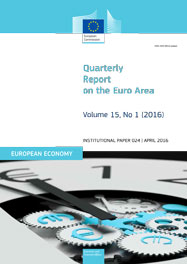European Commission, (2016), “Quarterly Report on the Euro Area”, Volume 15, No 1, Institutional Paper 024, Απρίλιος Structural reform measures underway in Italy, France, Spain and Portugal could have significant economic benefits and raise GDP, model simulations presented in this edition of the QREA show. Other chapters in this edition look at the effects of population ageing and slowing total factor productivity growth on GDP, inflation and interest rates; and the drivers …Read More
“Social dumping” and posted workers: a new clash within the EU
Vaccarino, Elena, Darvas, Zsolt, (2016), ” “Social dumping”and posted workers: a new clash within the EU”, Bruegel, 7 Μαρτίου European companies often post employees to another EU country to work there temporarily. These ‘posted workers’ must be paid at least the minimum wage of the host country, yet their wages can be lower than the wages of local workers. Now proposals for ‘the same pay for the same work at the same place’ …Read More
Slow Growth Is a Fact of Life in the Post-Crisis World
Blanchard, Olivier, (2016), “Slow Growth Is a Fact of Life in the Post-Crisis World”, Peterson Institute for International Economics, 13 Απριλίου Once the acute phases of the financial and euro crises were over, it was clear that it would take time for advanced economies to recover. The history of past financial crises gave a clear warning that recovery would typically be long and painful. Today, the scars are largely healed but growth is …Read More
Maximizing Price Stability in a Monetary Economy
Mosler, Warren, Silipo, Damiano B., (2016), “Maximizing Price Stability in a Monetary Economy”, Levy Economics Institute, Απρίλιος In this paper we analyze options for the European Central Bank (ECB) to achieve its single mandate of price stability. Viable options for price stability are described, analyzed, and tabulated with regard to both short- and long-term stability and volatility. We introduce an additional tool for promoting price stability and conclude that public purpose is …Read More
Review of the Role of the EIB Group in European Cohesion Policy
Van der Zwet, Arno, Bachtler, John, Miller, Stephen, Vernon, Phillip, Dozhdeva, Viktoriya, (2016), “Review of the Role of the EIB Group in European Cohesion Policy”, IP/B/REGI/IC/2015-019, Μάρτιος 2016 The aim of this study is to provide a comprehensive analysis and assessment of how the European Investment Bank contributes to the achievement of Cohesion Policy objectives. The study finds that the role of the European Investment Bank in Cohesion Policy increased significantly in the …Read More
Global Crisis in the US vs the Eurozone: Banks and monetary policy
Cukierman, Alex, (2016), “Global Crisis in the US vs the Eurozone: Banks and monetary policy”, VoxEu, 16 Απριλίου Although it started in the US, the Global Crisis had non-negligible repercussions in Europe as well due to substantial purchases of subprime securities by European banks and financial institutions. Those problems were subsequently amplified by European sovereign debt crises experienced by countries with weak fiscal institutions. Both the Fed and the ECB reacted …Read More
Shifting the Beveridge Curve : What Affects Labor Market Matching?
Bova, Elva, Tovar Jalles, João, Kolerus, Christina,(2016), “Shifting the Beveridge Curve : What Affects Labor Market Matching?“, IMF WP/16/9, Απρίλιος This paper explores conditions and policies that could affect the matching between labor demand and supply. We identify shifts in the Beveridge curves for 12 OECD countries between 2000Q1 and 2013Q4 using three complementary methodologies and analyze the short-run determinants of these shifts by means of limited-dependent variable models. We find that …Read More
Labor Market Reforms in Europe: Towards More Flexicure Labor Markets?
Eichhorst, Werner, Marx, Paul, Wehner, Caroline,(2016), “Labor Market Reforms in Europe: Towards More Flexicure Labor Markets?”, IZA DP No. 9863, Απρίλιος Labor market segmentation refers to a salient divide between secure and insecure jobs and is related to problems in important areas, including macro‐economic efficiency, workers’ wellbeing and repercussions for social cohesion. European countries have started a new wave of labor market reforms in the aftermath of the 2008/09 crisis to tackle …Read More
France, Germany and the New Framework for EMU Governance
Maris, Georgios, Sklias,Pantelis, (2016), “France, Germany and the New Framework for EMU Governance”, Journal of Contemporary European Studies/Volume 24, Issue 1, 2016, Απρίλιος The European crisis is the best case study for examining both the vulnerabilities of Europe’s framework for economic governance and the very process of European integration itself. This statement is true for several reasons: first, because the European crisis is the most serious crisis the European Union has …Read More
What’s Wrong With Negative Interest Rates?
Stiglitz, Joseph, (2016), “What’s Wrong With Negative Interest Rates?”, Social Europe, 13 Απριλίου The fact is that the eurozone’s structure and the ECB’s policies have ensured that banks in the underperforming countries, and especially in the crisis countries, are very weak. Deposits have left, and the austerity policies demanded by Germany are prolonging the aggregate-demand shortfall and sustaining high unemployment. In these circumstances, lending is risky, and banks have neither …Read More





